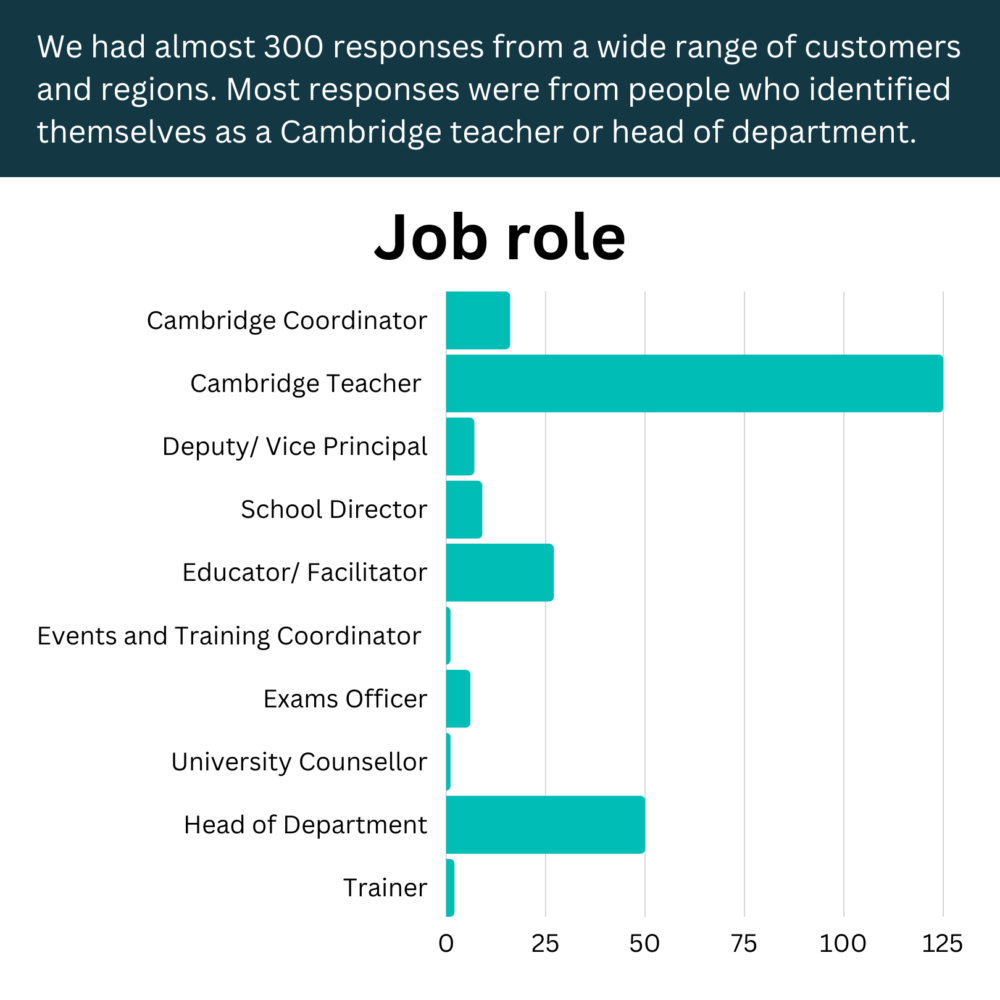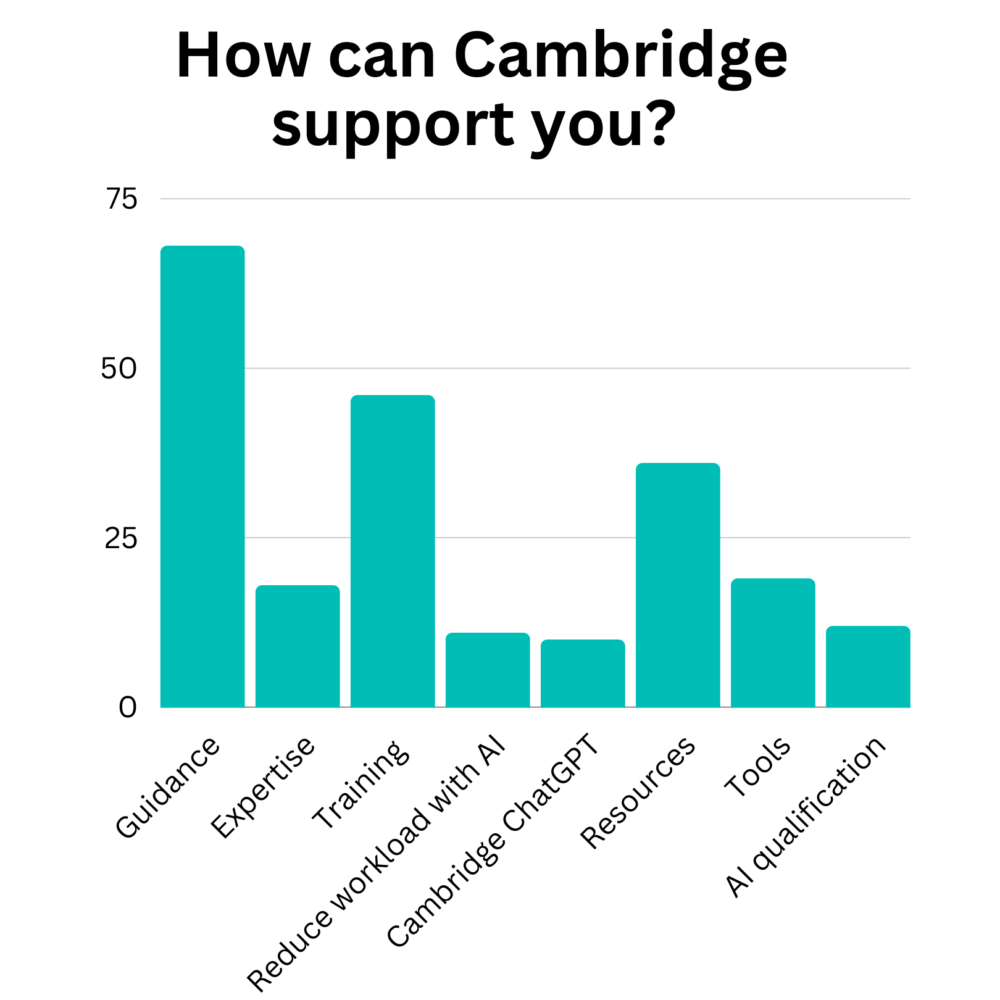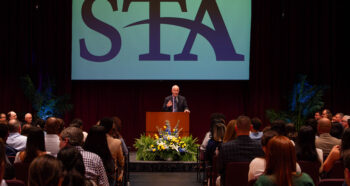The conversation about AI and education is picking up traction as teachers and school leaders question what this means for them and how they can harness new opportunities to use technology in the classroom. We issued guidance on our website but wanted to find out more about how our Cambridge community of schools are feeling.
At Cambridge, we are aware that some schools are concerned that their students may be using text and image generators, like DALL-E and ChatGPT, to help with work, or even submitting work produced by these tools in place of their own. Due to online response generators’ ability to produce plausible writing at the level and in the style of school-age learners, we understand why teachers are concerned about how to tell when they have been used.
So, we wanted to find out more.
Rachel Logan, Schools Liaison and Insight Manager, and Andrew Field, Senior Education Manager (digital innovation, teaching & learning), for International Education at Cambridge have been looking at ways to work collaboratively with teachers to find out what they really want; what will make a transformative difference.
Over the last few months, our Curriculum Support team have run an open survey on the School Support Hub, to ask teachers about their concerns regarding generative AI. The responses might surprise you.
The survey
The team asked the following questions to better understand schools’ concerns and feelings around AI text and image generators, and what they want from Cambridge to help them navigate the potential changes to education that generative AI can bring:
- What are your current thoughts, questions or concerns about AI in education?
- What changes (if any) have you made to your classroom practice?
- What changes (if any) have you made to your academic honesty policy and practices?
- Are you aware of any of your students using AI to help them with their written work?
- Which AI tools are you aware of being used?
- How can Cambridge support you?

We received almost 300 responses from Cambridge teachers and heads of departments.
Many of the responses were from English teachers, who clearly feel most affected by generative text AI tools in the classroom. We had a lot of responses from art teachers too, who felt that art and design is an area where image generators might be used, either positively or negatively by students.
How can Cambridge support you – what the results say
1. Guidance
The overwhelming response was that our Cambridge community is looking to us for guidance. They want us to be experts, working with other experts in the field to develop and guide the positive aspects that generative AI can bring to education. They expect Cambridge to have a seat at the table in leadership and governance for AI in Education.

Here are some of the responses around ‘guidance’:
“Cambridge can engage in public dialogue (like this survey) and policy discussions around AI ethics and governance, helping to shape the development of ethical and legal frameworks that promote the responsible use of AI. This can include working with policymakers, civil society organizations, and other stakeholders to develop policies that address the social and ethical implications of AI.”
“I would love some easy, quick to read info on the capabilities and limitations of the apps. Ideas from Cambridge or other teachers on how to structure cheat proof assignments would be helpful. I would also like specifics on how AI could enhance real learning (if it can) to harness it for good!”
“Guidelines for teachers, examples of how to use it as a teaching tool to prepare students for the IGCSE exams. Webinars for teachers that are subject specific: about how AI will change the way we teach, and students learn.”
2. Training
As well as guidance, schools asked for training, not just for staff, but webinars for parents and students. Teachers also asked for resources and support in order to use AI to make their life easier, leaving them more time to focus on teaching and classroom activities.
There were a lot of comments about how coursework would be affected and where we should adapt our assessment models so that project work and coursework tasks are based on analysis and evaluation. This is definitely an area to engage teachers on as we re-develop syllabuses as part of our rolling development programme, and as we develop new products. There was a strong demand for an AI syllabus or as a topic within digital literacy, data analysis or computing.
Teachers also asked for ‘a Cambridge ChatGPT’ to help them find and access resources that support them to improve their classroom practice:
“It would also be really nice if there was an AI tool that would synthesize exercises from past papers, in particular for listening exercises.”
What next?
It’s no secret that there are plenty of areas in any large organisation that could harness AI to streamline workflows and improve effectiveness, but we want to really get under the surface of what AI can do to reduce teachers’ workload and give them back their weekends.
This is where we want our Cambridge community to get involved; we’ve invited a group of teachers and school leaders to play, push the boundaries and explore the opportunities that generative AI tools can have in the classroom.
We have just concluded a six-week discovery phase with our Cambridge teachers and school leaders to explore what AI can do for them and how we can develop products to meet their needs. We are excited at the possibilities and the enthusiasm and support of our schools is shaping the direction of travel in this fast-moving area of technology.
If you would like to be involved in future conversations around AI, or would like to know more about this project, please get in touch at outlook@cambridgeinternational.org
Check back on the blog in a few weeks to see how we got on!
Related blog
What does generative AI mean for education and research and how is Cambridge responding? Read this blog to find out more





